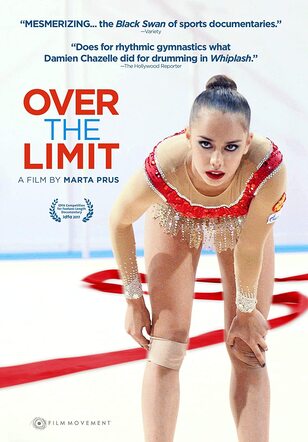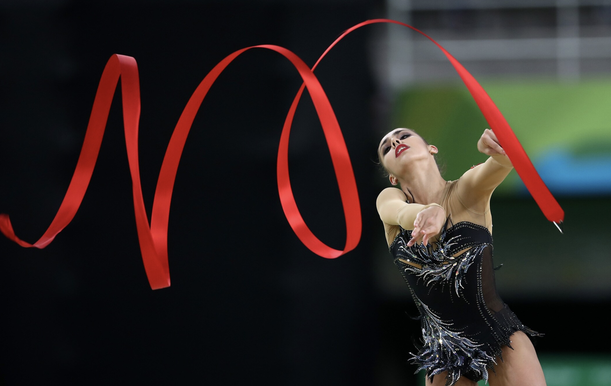A Quick Film Review

"You piece of shit."
"What a stupid loser."
These are just some of the bon mots offered by Irina Viner-Usmanova to rhythmic gymnast Margarita Mamun as the athlete works toward Rio 2016. Training moments are captured intimately by director Marta Prus in "Over the Limit", released in 2017 as a behind-the-scenes look at Mamun's journey to the Olympics.
That Prus chose Mamun as a subject proved prescient, as Mamun did win gold at the Rio Games after a stellar 2016 season in which she won all-around titles at the MTM Tournament, Thiais Grand Prix, Brno Grand Prix, and the Minsk, Guadalajara, and Kazan World Cups. And at the Baku World Cup just ahead of the Games, she set a new record for point totals (77.150) in her win.
But you certainly don't get a sense of all that success from Mamun in Over the Limit, as the main focus is in her training sessions, where she is subjected to withering criticism from Viner-Usmanova, the head of the Russian rhythmic gymnastics. It's a legendary program, in which Russians have won every Olympic gold medal since Sydney 2000 in both individual and group events. Mamun is sternly reminded by Viner-Usmanova that she's competing for Russia, and her teammate Yana Kudryavtseva dutifully stresses that importance in a joint press stop shown early in the film.
It's often argued that there's a fine line between strong, pointed coaching and emotional abuse. Whereas programs in the United States and Great Britain, notably, have received scrutiny for crossing that boundary, I'm guessing that Russia hasn't had their moment of introspection on the matter. While the sport is not widely popular in the United States, it is in Russia and much of Eastern Europe, from where the top competitors generally come. Would viewers there cringe at the "tough love"? It's hard to say where Prus falls on the matter, as she correctly lets the camera to be an impartial witness.
We also do see Mamun in lighter moments, celebrating a birthday with family, interacting with her boyfriend (swimmer Alexandr Sukhorukov), and letting loose with teammates on the beach at Rio. The scenes are reminders of her age...Mamun was only 20 at the time of the Olympics, after all. But mostly, though, the tone is of her alone with her thoughts. What is she thinking? Is she happy? The only true smile seems to come as she is awarded Olympic gold.
Mamun did retire after Rio. Between the weight of her father's illness and the hard work to persevere through training, her gold medal run is a justifiable close to a career, even at a young age. Perhaps, though, director Prus did show her hand with the film's title, "Over the Limit"...was Mamun pushed past hers?
Over the Limit is a fascinating look at one athlete's personal road to the Olympics. And, it's refreshing to see a documentary dedicated to rhythmic gymnastics. For someone oddly drawn to the new discipline while discovering it during Los Angeles 1984, I appreciate the attention to the athleticism and focus inherent in the sport. And, this documentary showcases Mamun as a great example of an Olympian's efforts against adversity to reach gold.



 RSS Feed
RSS Feed